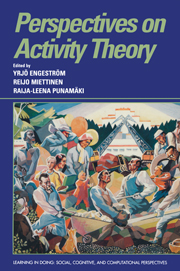Book contents
- Frontmatter
- Contents
- List of contributors
- Series foreword
- Introduction
- Part I Theoretical issues
- Part II Language and its acquisition
- 11 The expanded dialogic sphere: Writing activity and authoring of self in Japanese classrooms
- 12 Improvement of schoolchildren's reading and writing ability through the formation of linguistic awareness
- 13 Psychomotor and socioemotional processes in literacy acquisition: Results of an ongoing case study involving a nonvocal cerebral palsic young man
- Part III Play, learning, and instruction
- Part IV Technology and work
- Part V Therapy and addiction
- Author index
- Subject index
12 - Improvement of schoolchildren's reading and writing ability through the formation of linguistic awareness
Published online by Cambridge University Press: 05 June 2012
- Frontmatter
- Contents
- List of contributors
- Series foreword
- Introduction
- Part I Theoretical issues
- Part II Language and its acquisition
- 11 The expanded dialogic sphere: Writing activity and authoring of self in Japanese classrooms
- 12 Improvement of schoolchildren's reading and writing ability through the formation of linguistic awareness
- 13 Psychomotor and socioemotional processes in literacy acquisition: Results of an ongoing case study involving a nonvocal cerebral palsic young man
- Part III Play, learning, and instruction
- Part IV Technology and work
- Part V Therapy and addiction
- Author index
- Subject index
Summary
Introduction
Reading and writing are complex, conscious speech activities that require awareness of various aspects of linguistic reality: the phonological structure of words, the meaning of words, and the syntactic-semantic structure of sentences. L. S. Vygotsky characterized the peculiarity of reading and writing in the sentence “written speech is the algebra of speech.” According to him, writing “is a more difficult and a more complex form of intentional and conscious speech activity” (1987, pp. 204–205). He also pointed out that the real cause of difficulties for children in learning written speech is that “when instruction in written speech begins, the basic mental functions that underlie it are not fully developed; indeed their development has not yet begun” (ibid., p. 205).
Vygotsky's view of written speech is of particular importance when we construct literacy programs for teaching children with learning difficulties or learning disabilities. It suggests that if we can foster and develop a certain degree of linguistic awareness by some appropriate method before children begin to learn to read and write, we can decrease their difficulties and promote their success.
The idea of teaching phonological analysis of words to children at the beginning of literacy training originated historically with the phonological method for reading established by the Russian educator K. D. Ushinsky (1974) in the 19th century. For a long time, psychologists did not pay attention to his idea.
- Type
- Chapter
- Information
- Perspectives on Activity Theory , pp. 183 - 205Publisher: Cambridge University PressPrint publication year: 1999
- 4
- Cited by



